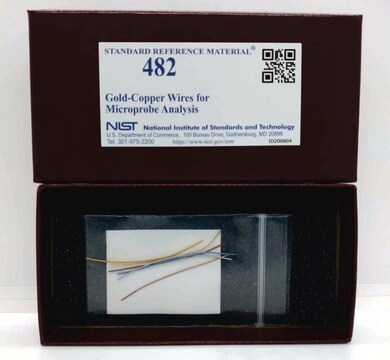326534
Gold
wire, diam. 0.25 mm, ≥99.9% trace metals basis
Sign Into View Organizational & Contract Pricing
All Photos(1)
About This Item
Empirical Formula (Hill Notation):
Au
CAS Number:
Molecular Weight:
196.97
EC Number:
MDL number:
UNSPSC Code:
12141717
PubChem Substance ID:
NACRES:
NA.23
Recommended Products
Quality Level
Assay
≥99.9% trace metals basis
form
wire
resistivity
2.05 μΩ-cm, 0°C
diam.
0.25 mm
bp
2808 °C (lit.)
mp
1063 °C (lit.)
density
19.3 g/mL at 25 °C (lit.)
SMILES string
[Au]
InChI
1S/Au
InChI key
PCHJSUWPFVWCPO-UHFFFAOYSA-N
Application
- Zaleplon in Toxicological Analysis: The development of an LC-MS-MS method to detect Zaleplon along with other benzodiazepines highlights its application in forensic and clinical toxicology, providing essential data for the analysis of Z-drugs in biological samples (Sofalvi et al., 2020).
- Study of Zaleplon′s Solvent Effects: Research on the solvent effects on Zaleplon′s absorption and fluorescence spectra aids in understanding its chemical behavior in different environments, crucial for its use in pharmaceutical formulations and biochemical studies (Divac et al., 2019).
- Zaleplon for Insomnia Treatment via Novel Delivery Systems: The development of orodispersible film and tablets for Zaleplon delivery targets improved patient compliance and rapid onset of action in insomnia treatment, emphasizing its role in sleep disorder management (Manda et al., 2018).
Quantity
280 mg = 25 cm; 2.8 g = 250 cm
Storage Class Code
11 - Combustible Solids
WGK
nwg
Flash Point(F)
Not applicable
Flash Point(C)
Not applicable
Personal Protective Equipment
dust mask type N95 (US), Eyeshields, Gloves
Choose from one of the most recent versions:
Already Own This Product?
Find documentation for the products that you have recently purchased in the Document Library.
Customers Also Viewed
Midas touch in cardiology.
Marianna Karamanou et al.
European heart journal, 34(20), 1463-1464 (2013-07-11)
Young Joo Choi et al.
Journal of nanoscience and nanotechnology, 13(6), 4437-4445 (2013-07-19)
Gold nanorods (Au NRs) that absorb near-infrared (NIR) light have great potential in the field of nanomedicine. Photothermal therapy (PTT), a very attractive cancer therapy in nanomedicine, combines nanomaterials and light. The aim of this study was to elucidate the
Tae-Sik Cho et al.
Journal of nanoscience and nanotechnology, 13(5), 3711-3714 (2013-07-19)
The crystallization of Au/glass ultrathin films for surface plasmon resonance (SPR) biosensor has been studied using synchrotron X-ray scattering and field emission scanning electron microscope. In films thinner than 30 nm, crystallized Au grains with [111] preferred orientation were formed
Yoon-Chae Nah
Journal of nanoscience and nanotechnology, 13(5), 3470-3473 (2013-07-19)
Au nanoparticles and poly(3-hexylthiophene) (P3HT) composite films were prepared by electrodeposition of Au nanoparticles using pulse-current electrodeposition followed by the spin coating of P3HT and their enhanced electrochromic coloration was investigated. A relatively uniformed Au nanoparticle was obtained by the
Nidhi Gupta et al.
Journal of nanoscience and nanotechnology, 13(7), 4917-4924 (2013-08-02)
The preparation and photocatalytic reductive ability of a new spongy flower or cotton bud like amorphous CdS microstructures (size = 200-300 nm) having intermediate crystal phase between cubic and hexagonal structure and possesses much larger surface area ca. 119 m2
Our team of scientists has experience in all areas of research including Life Science, Material Science, Chemical Synthesis, Chromatography, Analytical and many others.
Contact Technical Service
